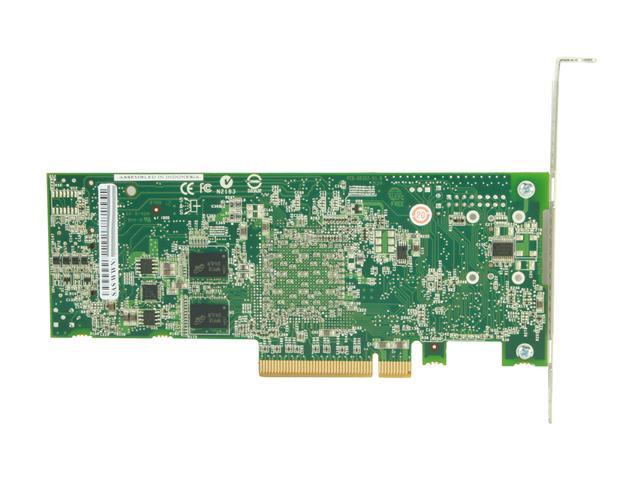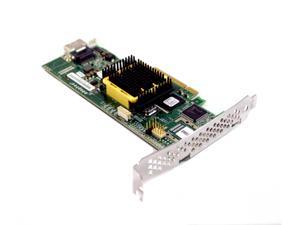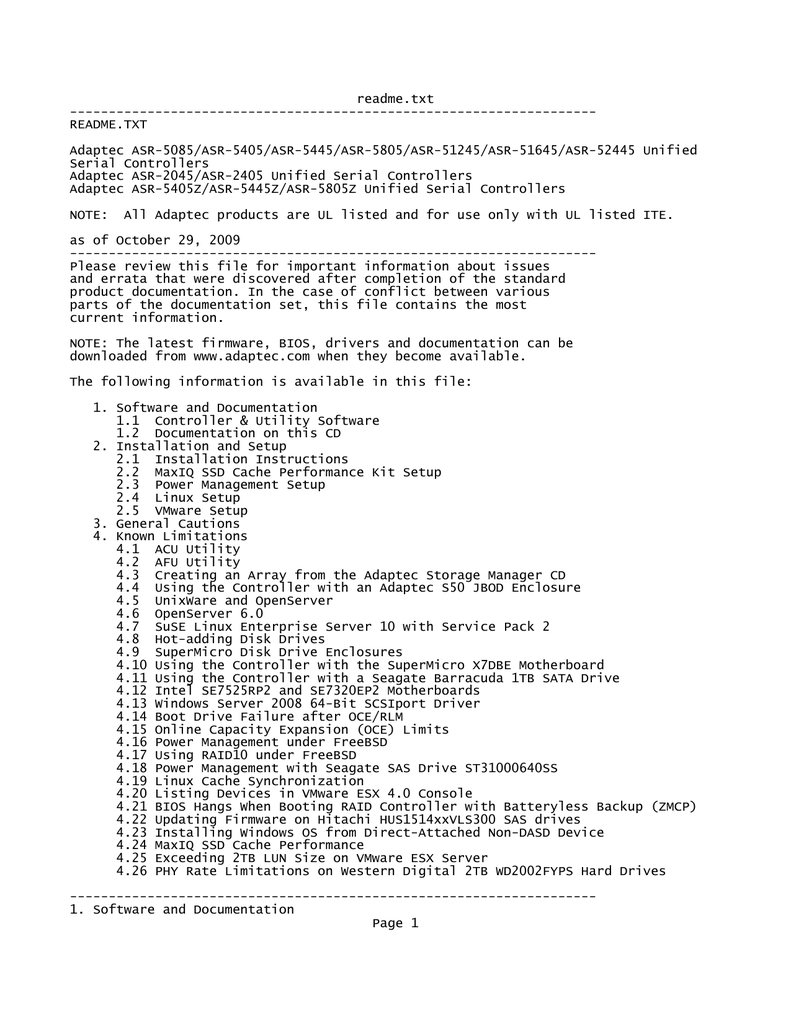Drivers Adaptec RAID 2405
Adaptec RAID 5405 » Adaptec RAID 5405Z » Adaptec RAID 5445 » Adaptec RAID 5445Z » Adaptec RAID 5805 » Adaptec RAID 5805Z » Adaptec RAID 5085 » Adaptec RAID 51245 » Adaptec RAID 51645 » Adaptec RAID 52445 » Adaptec RAID 3405 » Adaptec RAID 3085 » Adaptec RAID 3805 » Adaptec RAID 31205 » Adaptec RAID 31605 » Adaptec RAID 2405. Download Adaptec RAID 2405 PCI-E Adapter Firmware 5.2.0.18252 (Firmware).
Category: System and Controllers
Manufacturer: Adaptec Inc.
Caution Level: Safe
Download File Size: 128 MB
Operating System: Microsoft Windows, Red-Hat Linux, SUSE Linux, SCO OpenServer, UNIX ware, Sun Solaris, FreeBSD and VMware ESX
Latest Version / Release Date: 2260200-R / 01 Jul 2009
Windows device driver information for Adaptec RAID 2405
The Adaptec Raid 2405 is a storage device fitted into one's computer in order to provide added storage solutions. The device is a serial attached controller, which contains an 800 MHz processor, 128 MB DDR2 memory and an 8x electrical bus interface. The device is an entry-level controller that has different features that ensures that the storage capacity of the device is free of bottlenecks. This reduces the workload that would otherwise be handled by the main CPU thus significantly increasing the capacity of the CPU to process information. The device is part of the Adaptec unified-serial series 2 family, whose RAID controllers leverage dual-core hardware. The RAID 2405 offers support to multiple operating systems, and supports up to 128 devices. In addition, the device is compatible with a wide range of third-party devices. The device is also fully integrated with the storage manager by the same manufacturing company, thus centralizing the management if device controllers.
Outdated Drivers?
Unless you update your drivers regularly you may face hardware performance issues.
To check your drivers you should manually verify every device on your system for driver updates
Some highlights of the device include the intelligent power-management capacity, four internal ports, a MD2 low-profile factors, 800 MHz processor, an eight lane PCI express bus boundary, 10, 1 and 0 raid levels, a DDR2 cache with a 128 MB capacity and a minimum of 128 SAS or SATA drives, which use SAS expanders. The device also has SFF-8087 connectors and an Adaptec storage- manager. The power management capacity in the device reduces power use by about 70 percent by spinning down power usage in idle disks. This effectively means that no power is used to cool the idle disks and those only active disks receive power. The four internal ports also enable the user to connect to SATA or SAS devices. Most users have no problems installing this device on their computers especially because it is compatible to wide range of operating systems. It is highly recommended you run a free registry scan for Windows and Adaptec RAID 2405 errors before installing any driver updates.
Test Setup & Configuration
To assess the performance of the Adaptec RAID 2405 SAS/SATA controller we will be running a total of three tests. Each of the tests will feature two drives configured in RAID0 with comparisons being made to Intel's motherboard based 'Matrix' RAID controller. While not a directly comparable product to the Adaptec solution due to its lack of dedicated Memory and CPU, Intel's Matrix RAID is without doubt the most widely used controller in the enthusiast community, and it will certainly be interesting to see how the two compare.Intel Core 2 Quad Q6600 'G0' @ 3.6GHz
Motherboard
ASUS P5E64 WS Evolution (Intel X48 Northbridge, ICH9R Southbrdge)
Array 1
Adaptec RAID 2405 SAS Controller
Seagate Barracuda ES.2 500GB 7200RPM 16MB
Configuration: RAID0 / 128kb Blocks
Array 2
Intel Matrix RAID on ASUS P5E64 WS Southbridge (ICH9R)
Western Digital Velociraptor 300GB 10000RPM 16MB
Configuration: RAID0 / 128kb Blocks
Array 3
Adaptec RAID 2405 SAS Controller
Western Digital Velociraptor 300GB 10000RPM 16MB
Configuration: RAID0 / 128kb Blocks
• HDTune Pro v3
• Sisoft Sandra 2009
File Write & Manipulation
• WinAVI (with 500mb AVI file)
• Dummy File Generator (Write speed test with varying size files)
• Peazip (File Compression / Decompression)
OS & Gaming
• Racedriver GRID (Game loading times)
• Windows Vista x64 (Startup time)
Adaptec Storage Manager V7.00.18781 For 64-bit Linux
Most Recent Comments
IT would seem that for a fairly small raid 0 array it is not really worth it...
It would be nice to see a 4 or even 6 disk comparison sometime in the future Quote
Why you don't mention missing RAID 5 (6) as 'BAD'.
My opinion, it is very bad.
The second thing that was more then surprising is 2 HDD configuration.
Dedicated Hardware RAID controllers may perform on the same level (or even worse) as software assisted with 1 disk attached.
With 4 disks you can get 300+ MBps read write.
Once, during my work in HP IT department i had an opportunity to play with few RAID setups and found that dedicated hardware controllers begin significantly outperform software assisted controllers like onboard controllers on almost any M/B when used in RAID 5 or 10 setups in system under load.
It worse nothing to compare them like you did.
Try to ran on top of your OS DB + Web serving 500+ connections per minute at least + ran some serious CPU intensive task (like C or C++ compilation) and then you'll see what you paid for with Hardware RAID controller.
But the bottom line, It is good to see that this site reviews not only i7 or HD4870 like others do.
Keep doing it Quote
Originally Posted by name='n0nsense' I wondering ... Why you don't mention missing RAID 5 (6) as 'BAD'. My opinion, it is very bad. |


Originally Posted by name='n0nsense' The second thing that was more then surprising is 2 HDD configuration. Dedicated Hardware RAID controllers may perform on the same level (or even worse) as software assisted with 1 disk attached. With 4 disks you can get 300+ MBps read write. |

Unfortunately two hard disks was all that Adaptec provided us with for the review. Not surprising either considering they are close to £200 each.
Quite true, SAS or 10k SATA are expensive.
If you still have the adapter, try it with regular (7.2k) SATA drives.
Cached
(you don't even have to have same model or size drives)

Make 4 drives RAID 0, sit down, run the test
I guarantee you'll have a little orgasm Quote
 Reply
Reply